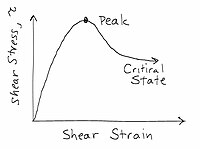
Photo from wikipedia
This study mainly establishes a novel intelligent assessment model for peak shear strength of rock joints based on the relevance vector machine (RVM). RVM is a state-of-the-art soft computing technique… Click to show full abstract
This study mainly establishes a novel intelligent assessment model for peak shear strength of rock joints based on the relevance vector machine (RVM). RVM is a state-of-the-art soft computing technique that has been rarely utilized in joint shear strength assessment. To establish the hybrid intelligent model, three-dimensional scanning tests and direct shear tests on 36 granite joint specimens were conducted. The peak shear strength ratio ( ) is perceived as an explanation of four types of influencing factors, including joint surface roughness, strength of rock material, basic friction angle, and normal stress. In particular, the compressive strength and tensile strength of rock material are first considered together. A total of 36 experimental data were used in this study to train the RVM model to predict the peak shear strength of rock joints. The performance of the RVM model was assessed using the direct shear test data of rock joints collected from previous researches. Four different kinds of kernel functions were adopted to obtain the optimal model. Results show that the proposed model is significantly efficient in predicting the peak shear strength of rock joints. The proposed model is also a promising tool for peak shear strength of rock joints and provides a new research approach to research the mechanical properties of rock joints.
Journal Title: Mathematical Problems in Engineering
Year Published: 2019
Link to full text (if available)
Share on Social Media: Sign Up to like & get
recommendations!